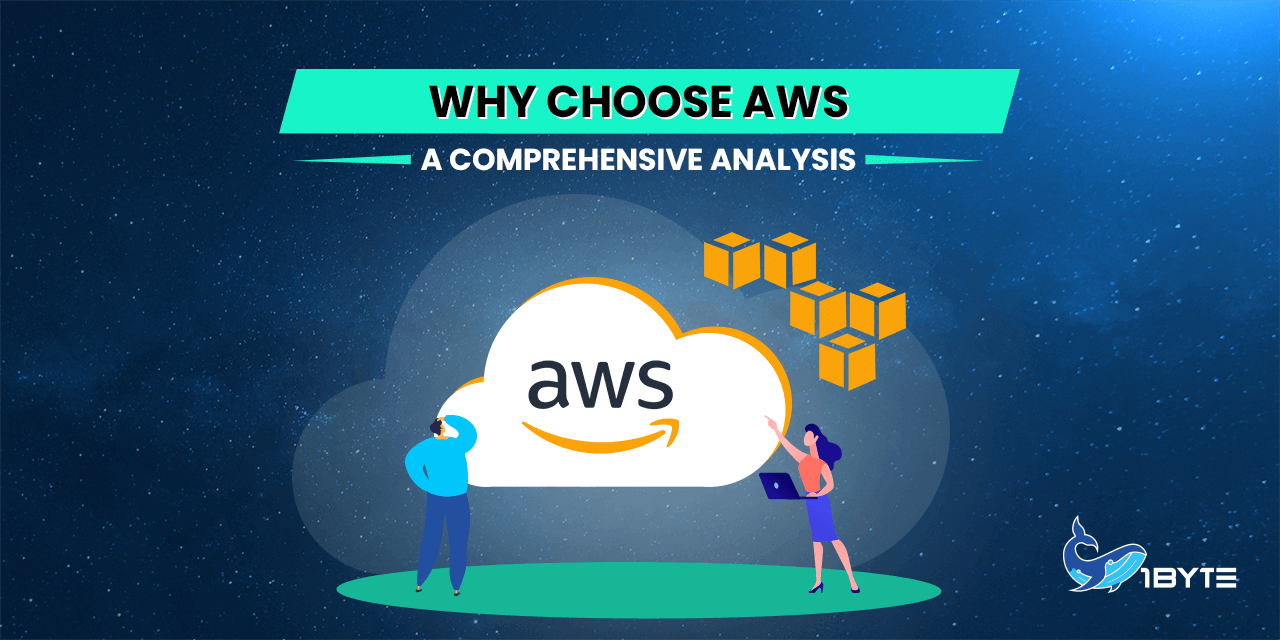Are you looking for a dependable cloud supplier for your business? Have a look at Amazon Web Services (AWS). But, why choose AWS? We will elaborate on it.
In this comprehensive review, we will go into the reasons why Amazon separates from other cloud providers. By the end of it, hopefully, you have got an idea of what makes AWS the top choice as cloud providers.
An Overview
Let’s start with the relevant fundamentals: what is AWS, and how is the current state of cloud computing?
FURTHER READING: |
| 1. Top 10 AWS Partners: A Complete Network List |
| 2. AWS Cloud Pricing: The Complete Guide |
| 3. Unveiling 1Byte's Triumph: AWS Partner of the Year 2023 in the Emerging Market |
What is AWS?
AWS is an abbreviation for Amazon Web Services. It is a cloud-based platform that offers organizations and people computing power, storage, and other services. AWS is popular because it is inexpensive, adaptable, and scalable. In other words, it is inexpensive, simple to use, and capable of handling both little and huge workloads. AWS is also safe, dependable, and global in scope. It has data centers all across the world, allowing businesses to access their data from anywhere.
AWS is advantageous to startups, small businesses, and major corporations. AWS is an affordable option for entrepreneurs to get started in the cloud. Entrepreneurs can utilize AWS to swiftly launch a product or service without investing in costly infrastructure. AWS can help small firms save money on IT bills. AWS can host websites, store data, and run apps for small businesses. AWS can provide the scale and flexibility required by large companies to handle large workloads. Big organizations can utilize AWS to run all or part of their IT infrastructure.
In short, AWS is a cloud-based platform that offers businesses and people computational power, storage, and other services. It is inexpensive, adaptable, scalable, secure, and dependable, with a worldwide reach. AWS is advantageous for startups, small businesses, and large enterprises because it offers a low-cost option to get started in the cloud, saves money on IT expenses, and provides scalability and flexibility to handle large workloads.
The Current State of Cloud Computing
Cloud computing is rapidly changing, and AWS is leading the drive. According to Cloudwards.net, Amazon is the most popular cloud service provider. The epidemic has accelerated cloud adoption, and new cloud usage habits are emerging.
Companies want to unlock transformational performance by scaling their apps and data across their business IT landscape, and mastering hybrid cloud is critical to doing so. The IBM Transformation Index demonstrates how hybrid cloud enables businesses to use applications and data at scale while maintaining speed and security.

Cloud computing is also being used more widely in higher education institutes for classroom teaching, with digital teaching enabled by ICT technologies serving as a focal focus.
To summarize, the current status of cloud computing is one of rapid evolution, with Amazon leading the way. The key to unleashing revolutionary performance is hybrid cloud, and the epidemic has accelerated its adoption. Cloud computing is also increasingly being employed in classroom instruction in higher education institutions. Companies that use AWS can take advantage of its popularity and dependability in providing cloud services, which can drive innovation, agility, and scalability.
AWS as An Integral Part of Cloud Computing
Amazon Web Services is the undisputed industry leader in cloud computing. In reality, Amazon is the world’s most popular and frequently utilized cloud service. With a market share of over 32%, it’s no surprise that an increasing number of enterprises are turning to Amazon for their cloud computing needs.
Why choose AWS? The numbers really speak for themselves. To begin, AWS provides over 200 fully-featured services from data centers around the world, making it the most complete and scalable cloud platform available. Furthermore, Amazon is the go-to pick for many enterprises due to its dependability, with an uptime of more than 99.9%.
Also, AWS is quite cost-effective. Businesses can save up to 50% on IT infrastructure costs by using AWS. Furthermore, because of AWS’s pay-as-you-go pricing model, businesses only pay for what they use, making it an appealing alternative for enterprises of all sizes.
Another significant advantage of AWS is its security. To safeguard your data, AWS provides industry-leading security features including encryption, firewalls, and identity and access control tools. Businesses may also be confident that their data is secure and consistent with industry standards thanks to AWS’s compliance certifications, which include HIPAA, SOC 1/2/3, and PCI DSS.
Finally, it’s important to emphasize that cloud computing is rapidly expanding. Precedence Research predicts that the cloud computing market will exceed $1 trillion by 2028. The multiple benefits of cloud computing, such as scalability, cost savings, and increased security, are driving this expansion.
The Advantages of AWS
In this section, we’ll look at the benefits of AWS and why it’s the best option for your company. Let’s get this party started!
Scalability
One of the most significant advantages of AWS is its scalability. It enables enterprises to scale up or scale down their computing resources based on their demands. For example, if a company encounters a sudden rise in traffic, they can raise their resources to meet the demand. In contrast, if demand falls, they can reduce their resources to save money. This on-demand scalability option is critical for firms that experience seasonal fluctuations.
Amazon offers a variety of tools and services that make scaling up and down simple. Amazon Elastic Compute Cloud is one such technology (EC2). It enables enterprises to establish virtual servers that may be scaled up or down as needed. Another option is Amazon Simple Storage Service (S3), which provides enterprises with scalable and long-lasting storage. Furthermore, AWS Auto Scaling aids in the automation of the scaling process by automatically altering the resources based on demand.
Businesses don’t have to worry about being unprepared or overspending on resources when they use AWS. Businesses may simply tailor their computing resources to their specific need and just pay for what they use. AWS’s scalability is probably one of the reasons it is the world’s most popular cloud platform.
Reliability
One of the most crucial elements to consider when selecting a cloud computing provider is reliability, and Amazon succeeds on that front. AWS assures the high availability of its services and applications through its worldwide infrastructure and different availability zones. This means that even if one data center has an outage, other data centers will ensure that services continue to run uninterrupted.
AWS offers a 99.99% uptime Service Level Agreement (SLA), which means that it guarantees the availability of its services for virtually the whole year. This dependability is especially important for enterprises that rely on cloud services to run mission-critical applications.

Amazon also provides automatic failover and disaster recovery capabilities, allowing for seamless recovery in the event of an unexpected failure. AWS offers a variety of tools and services, such as Amazon CloudWatch, AWS CloudTrail, and Amazon S3 Versioning, to assure data integrity and service availability.
All of these capabilities combine to make Amazon a dependable cloud platform on which organizations can rely to offer consistent services even in the face of unforeseen catastrophes.
Security
When it comes to cloud computing, security is critical, and AWS is well aware of this. They have implemented different security procedures to protect their customers’ data from unwanted access, theft, or loss. Amazon offers data centers all around the world that are protected by multiple levels of physical and logical security mechanisms, such as 24/7 monitoring, biometric identification, and multi-factor access control. They have also implemented encryption at rest and in transit for any data stored on their servers.
Amazon also has compliance certifications from a variety of regulatory agencies, including HIPAA, PCI, and SOC, which assure consumers that their services are secure and meet industry standards. AWS has a Shared Responsibility Model, which implies that they are responsible for securing the underlying infrastructure while their customers are responsible for securing the applications and data that run on top of that infrastructure.
Furthermore, AWS offers a variety of security tools and services to assist customers secure their workloads, including AWS Identity and Access Management (IAM), AWS Key Management Service (KMS), AWS Certificate Manager (ACM), and Amazon Inspector. These tools assist clients in managing access to Amazon resources, encrypting data, managing and securing SSL/TLS certificates, and identifying vulnerabilities in applications and infrastructure.
All of these safeguards and capabilities combine to make Amazon a highly secure cloud computing platform, making it a top choice for businesses and organizations that demand high levels of data and application security.
Cost-effectiveness
Cost-effectiveness is an important consideration in company decisions of all sizes. Amazon charges you only for the services you use, resulting in cost-effective solutions. AWS provides a pay-as-you-go pricing approach, allowing you to pay only for the services you use, with no upfront fees or long-term commitments. This pricing flexibility implies that you can scale up or down based on your business needs and pay accordingly.
When compared to typical on-premises infrastructure arrangements, this pay-as-you-go strategy allows organizations to save a significant amount of money. Because businesses do not need to invest in expensive hardware or on-site data centers, AWS’s cloud computing architecture allows them to run their applications, websites, and databases at a lower cost.
Furthermore, AWS gives organizations tools and services to help them optimize their spending and cut costs even further. Amazon’s Cost Explorer, for example, allows firms to assess their AWS spending and make cost-cutting recommendations. It provides useful insights into your consumption patterns and assists you in identifying areas of your infrastructure that may be optimized to save money.
Furthermore, by committing to a one- or three-year term, businesses can save up to 75% on compute costs using AWS’s Reserved Instances. Businesses may lock in reduced rates and secure capacity, making budgeting more predictable.
Innovation
AWS distinguishes itself from its competition through innovation. The organization is continually introducing new products and services to satisfy the changing needs of its clients.
AWS’s dedication to innovation has led to several game-changing services that have transformed the way businesses operate. AWS Lambda, for example, enables developers to run code without needing to manage servers. This service has substantially decreased the time and effort required for application development and deployment, making it a popular choice among developers.
Furthermore, AWS’s machine learning services have simplified the integration of AI into company operations. SageMaker, for example, is a package of tools that makes it simple to develop, train, and deploy machine learning models. As a result, businesses may gain insights from their data fast and make informed decisions.
AWS also invests substantially in R&D to ensure that its clients have access to cutting-edge technology. Through this investment, AWS has been able to keep ahead of the competition and provide cutting-edge solutions to its clients.
Use Cases
When it comes to cloud computing, AWS provides a wide range of services to a variety of industries and enterprises. AWS has been used successfully by startups, mid-sized businesses, and even some of the world’s largest enterprises. In this section, we’ll look at some of the most common AWS use cases and how businesses of various sizes and industries have used the platform to achieve their objectives. AWS has the tools and resources to help you succeed, whether you are a startup trying to scale, a major organization looking to improve operations, or everything in between.
For Small Businesses
Small firms may lack the means to manage and maintain their own data centers, making it difficult to conduct their operations properly. This is where Amazon Web Services (AWS) enters the picture. Amazon gives small businesses the tools they need to manage their data and apps on a budget.
Scalability is one of the primary advantages of adopting AWS for small organizations. Small businesses may quickly scale their resources up or down based on their needs with AWS, without incurring any upfront expenditures. This implies they can expand their company without having to make large capital investments.
Another benefit of utilizing AWS is security. Amazon provides sophisticated security features including firewalls, intrusion detection, and encryption to assist small businesses in keeping their data secure. Furthermore, AWS has a shared responsibility paradigm in which they are responsible for cloud security while customers are responsible for cloud security.
Amazon also gives small businesses access to a variety of services such as computation, storage, databases, and analytics. This means that small firms can use cutting-edge technology to improve operations and make smarter judgments.
Furthermore, AWS offers a pay-as-you-go pricing plan, which is great for small enterprises with limited resources to invest upfront. This pricing model allows small firms to pay just for the services they utilize, which can result in significant cost savings.
For Enterprises
AWS provides various advantages for large-scale businesses that demand reliable infrastructure and secure data handling. Below are some examples of AWS use cases for businesses.
- Big Data & Analytics: AWS offers a number of data analytics solutions to assist enterprises in managing and analyzing enormous amounts of data. Amazon Redshift, a fully-managed data warehouse service, allowing businesses to cost-effectively and efficiently store and analyze petabytes of data.
- Machine Learning: With Amazon SageMaker, organizations can quickly design, train, and deploy machine learning models on AWS. This service provides pre-built algorithms, making it easier for developers to generate bespoke models that are tailored to their individual requirements.
- Businesses with high-performance computing (HPC) requirements might benefit from AWS’ Elastic Compute Cloud (EC2) instances. These instances enable enterprises to run large-scale parallel workloads and complicated simulations.
- Internet of Things (IoT): Amazon Web Services (AWS) provides a comprehensive set of IoT services, including AWS IoT Core, which enables secure communication between connected devices and cloud applications.
- AWS offers a Content Delivery Network (CDN) service, Amazon CloudFront, that enables organizations to deliver static and dynamic information, including video and music, to users around the world with minimal latency and high transfer speeds.
According to the AWS website, AWS is used by more than 90% of the Fortune 100 firms for cloud computing. This demonstrates significant organizations’ faith and confidence in AWS’s capabilities.
For Governments
To manage sensitive data, governments require highly secure and compliant systems, and Amazon provides a variety of services that meet these requirements. One of the most important advantages of AWS for governments is its capacity to support large-scale operations with excellent performance, stability, and scalability, allowing agencies to handle surges in demand without losing performance.

AWS GovCloud is a dedicated region designed to host sensitive data and regulated workloads in the cloud while meeting government agencies’ high compliance standards. Government agencies can benefit from the same agility, security, and cost benefits as the commercial AWS region through AWS GovCloud, while also guaranteeing compliance with various legislation and security standards.
Furthermore, Amazon provides a wide range of security and compliance certifications, including the Federal Risk and Authorization Management Program (FedRAMP), a US government-wide initiative that provides a consistent approach to cloud security assessment, authorization, and continuous monitoring. As a result, government agencies can rely on AWS to assist them in meeting legal obligations, improving their security posture, and reducing the risk of data breaches.
Conclusion
Choosing Amazon Web Services as your cloud service provider might have a big influence on your business. AWS has become a go-to choice for organizations, enterprises, and even governments because of its large range of services, dependable infrastructure, and thorough security measures.
As an official AWS partner, 1Byte has seen firsthand the advantages that AWS can provide. By utilizing AWS, you can be confident that you will have access to the most recent technology and developments in the industry, ensuring that your company remains competitive and adaptable. We at 1Byte are dedicated to providing our clients with high-quality cloud solutions, and our cooperation with Amazon enables us to do so.
So, why should you use AWS? The answer is straightforward: Amazon provides unrivaled reliability, scalability, and security, making it the ideal alternative for enterprises of all sizes. Call 1Byte today to find out how we can assist you with migrating to AWS and reaping the benefits of the world’s leading cloud service provider.

